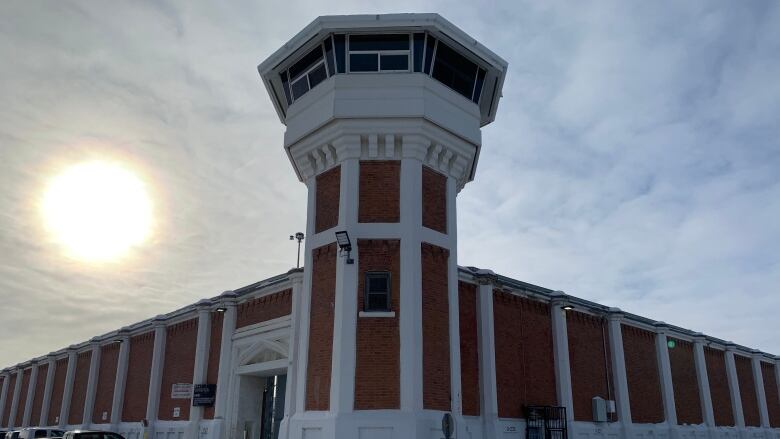Inmates 'think this is like a death sentence,' advocate says of COVID-19 outbreak at Sask. Penitentiary
No choice in some scenarios to separate positive cases in units, Correctional Officers union president says

"Do you want to know something baby ...I think I might have the f--king COVID-19," Bronson Gordon sayswith a scared-soundingvoiceas it crackles on an audio recording.Gordon is an inmate inside the Saskatchewan Penitentiary in Prince Albert.
"All of us guys, we think we're going to f--king die in here," he continues.
The audio was shared with CBC Saskatoon by Sherri Maier, an advocate for those inside the prison system with Beyond Prison Walls Canada and Gordon's loved one.
She's been keeping in constant contact with some of those on the inside of the federal facility and says things have been deteriorating for inmates since an outbreak was declared at the Correctional Service Canada (CSC) facility on Dec. 12.
Maier says healthy inmates are being housed with COVID-19-positive cases, andinmates have seen their outdoor time reduced significantlyto only 30 minutesevery second daywith information on the spread of the outbreak just as scarce.

"All of these people here are suffering," Gordon said in the recording, in which he says he's speaking on behalf of a group of inmates in the facility.
He details how inmates who have tested positive for COVID-19 are being kept in units with healthy inmates, having their cells taped off as a way to isolate, but like many others, he's worried it's not enough.
"They won't take them off the unit," he said in the recording, his frustration clear.
Inmates started hunger strike: advocate
Maier says the frustration she's been hearing from Gordon is shared by many of his fellow inmates and says as of Saturday, several of them have started a hunger strike to protest the conditions inside of the facility.
She says things have been extremely difficult for those residing in the federal prison, as they're worried their lives are in danger and the lack of time outside of their cells have them feeling disconnected from their loved ones during the holidays.
"They're scared," Maiersaid. "I get guys that tell me they're scared. They're worried. Some of them do have compromised immune systems. Some of them are close to getting outin a year or six monthsbut some of them don't think they will. They think they'll be sick and dead.
"They think this is like a death sentence," she said.
Alongside asking for more time outside of their cells, inmates also want better access to PPE from CSC and for the federal body to implement better protocols that will protect healthy inmates from positive cases.

As of Saturday, CSC indicated in a statement that they had not received any reports of a hunger strike underway at the facility. CSC stated that they declare a hunger strike only if a strike declared by an inmate (or inmates)hasbeen underway for seven days.
However, the CSCnoted when a hunger strike is reported, those participating will be assessed daily by healthcare professionals.
The statement also noted it will "work in collaboration with offenders in attempt to resolve the issues which led offenders to declare a hunger strike."
Rapid tests helping
James Bloomfield, the prairie region president for the Union of Canadian Correctional Officers, said there are roughly 64 cases in inmates and one in a staff member.
He notes one of the main reasons cases have climbed so quickly is because staff are now doing rapid, asymptomatic testing within the prison population. Now, with test results coming back within 30 minutes, he says it's been a big help.
"Instead of waiting three or four days, and not knowing who is or who isn't positive, we end up being able to pick out all of the asymptomatic out of an entire population fairly quickly within a couple of days depending on how fast we test both populations.
"So It allows us to really bring these groups together, isolate things as much as possibleand then start using the appropriate protective equipment to ensure that the spread is as minimal as possible."
Bloomfield confirmed there are situations whereCSC is housing COVID-19 positive inmates with healthy inmates on the same units, but notes the dynamics of the facility sometimes make it impossible to keep positive cases separate.
"There are some scenarios where we don't have a choice in that," he said.
Asymptomatic testingshowed cases were in various parts of the facility, and while they have been trying to group COVID-19 positive inmates, others must remain celled in specific locations for security and safety purposes.
"[Saskatchewan Penitentiary] is a full, multi-level facility, up to full maximum security," he said. "We have a lot of individual areas that we have to maintain people in that cannot mix with other populations."
There is no playbook for a pandemic in a correctional facility.- James Bloomfield, prairie region president of Union of Canadian Correctional Officers
However he notedif inmatescannot be housed with other COVID-19 positive individuals, they will be isolated within their own units. He said while staff across the board are doing their best, the situation has taken a toll on everyone involved.
"As more cases come in, the more mental strain that is on that staff on top of all the normality that goes with their job, which is a wild environment to say the least."
He says staff at the facility are getting the support they need from the federal government, and while there are times when arguments occur, everyone is focused on getting to the other side of the outbreak as safely as possible.
"There is no playbook for a pandemic in a correctional facility," he said.
Movements kept to a minimum
The CSC indicated it's ensuring inmates have daily access to telephones, showers and time out of cells while the COVID-19 restrictions are in place, noting modified routines are in effect to try to maximize the amount of time inmates spend out of their cells.
But as the CSC works to keep risk of transmission of COVID "as low as possible," inmate movements are being kept to a minimum, with inmates isolating in their cells where they have access to medical care and other supports, like telephone calls with Elders and prison chaplains.
A separate statement from CSC explained that "extensive infection prevention and control measures" have been put in place at its 43 federal facilities across the country to keep both staff and inmates safe.
"These include mandatory masks for inmates and staff, physical distancing measures, active health screening of anyone entering our institutions, increased and enhanced cleaning and disinfection at sites," with more PPE available if needed, the statement said.
The statement also indicated contact tracing is underway, noting an additional 250 personnel have been committed to the task across the country, as the agency focuses on minimizing risks that would introduce COVID-19 into its institutions.
"This includes CSC's active planning in early identification, containment and appropriate treatment should the virus be introduced to one of CSC's sites. CSC has strengthened infection prevention procedures to protect staff, offenders, volunteers and the public and we are actively engaging experts on public health and infection prevention to guide our response," the statement said.
'Grim reality' of sitting in cells alone for Christmas
For Maier and others with loved ones incarcerated, they fear things inside the facility will get worse before they get better, and stress and anxiety from the outbreak will magnifyas inmates spend more and more isolated and afraid.
"One guy said: 'I can hear some of them crying at night,'" she said. "And they feel bad for their family. They had hoped it would end by tomorrow, but there's the grim reality that this could be what these guys are doing for Christmas, is sitting in their cells, by themselves."
Saskatchewan Penitentiary isn't alone in its dealing with a COVID-19 outbreak, as both the Saskatoon Provincial Correctional Centre and the Regina Provincial Correctional Centre are also dealing with COVID-19 outbreaks.
As of Saturday afternoon, a total of 13,329 cases of COVID-19 have been recorded in the province, of which 3,762 are considered active and 9,452 are considered recovered.












_(720p).jpg)


 OFFICIAL HD MUSIC VIDEO.jpg)
.jpg)



























































































